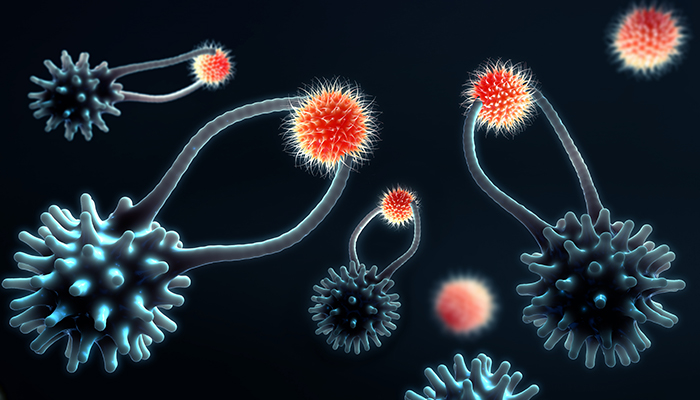HOW CAN WE HELP YOU? Call 1-800-TRY-CHOP
In This Section
Scientists Target FLT3 Protein in New Approach for High-risk Childhood Leukemias

Dr. Tasian’s lab team, in collaboration with Dr Fry’s lab team at Children’s Hospital Colorado, are pursuing a new immunotherapy strategy that targets the FLT3 receptor protein as a potential treatment for children with AML.
While the development of CAR T cells that target the CD19 protein on B-acute lymphoblastic leukemia (ALL) cells has effectively overcome chemotherapy resistance for many pediatric patients with relapsed ALL, it can be a different story for children, particularly infants, whose leukemias harbor KMT2A genetic rearrangements. For this subset of higher-risk patients, the pressure of CD19 CAR T cell immunotherapy can cause ALL to morph into a largely-incurable form of acute myeloid leukemia (AML).
With a strong track record of bench-to-bedside translation of CAR T cells for high-risk pediatric leukemias, Sarah K. Tasian, MD, chief of the Hematologic Malignancies Program at Children's Hospital of Philadelphia, and her lab team have partnered with Co-Principal Investigator Terry Fry, MD, and his lab team at Children's Hospital Colorado, and the Pediatric Cancer Foundation to pursue a new immunotherapy strategy that targets the FLT3 receptor protein as a potential treatment for children with AML.
"Because of the generous funding provided by Pediatric Cancer Foundation, we can now work to translate our FLT3 CAR T cell immunotherapy from promising results in the laboratory to the clinic," Dr Tasian said. "We feel so fortunate to forge a new partnership with the PCF and hope this clinical trial will have significant potential to credential a promising new immunotherapy against a shared target in two major types of high-risk childhood leukemias."
The study team is building on the traction gained using targeted inhibitors in adults with AML. The fms-like tyrosine kinase 3 receptor, or FLT3, is a protein found on the outer membrane of some leukemias, including AML with FLT3 genetic mutations. Additionally, researchers know that patients with KMT2A-rearranged B-ALL predisposed to turning into AML have high levels of non-mutated FLT3 protein.
The Tasian laboratory at CHOP and the Fry Laboratory at Children's Hospital Colorado published results earlier this year that showed FLT3 CAR T cells were effective at attacking and killing both AML and ALL cells in in vitro and in vivo models of the diseases. Remarkably, FLT3 CAR T cells eradicated both KMT2A-rearranged ALL and ALL that had changed (lineage-switched) to AML after CD19 CAR T cell treatment.
Based on these results, Dr. Tasian's team is eager to develop in two to three years a first-in-human phase 1 clinical trial that to evaluate the therapy's safety and preliminary efficacy in patients with relapsed/refractory FLT3-mutant AML and/or KMT2A-rearranged ALL.
"This process has a long runway, taking multiple years to go from the bench to the bedside. Our focus on translational science is what makes CHOP unique," said Dr. Tasian, who holds the Joshua Kahan Endowed Chair in Pediatric Leukemia Research at CHOP. "The overarching goal is not only to accomplish innovative science and address persistent knowledge gaps, but also to deliver successful discoveries to children with high-risk leukemias as quickly as possible."